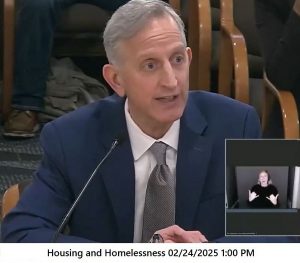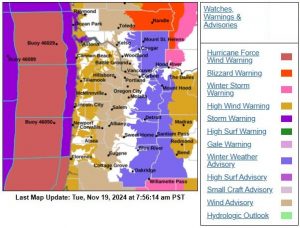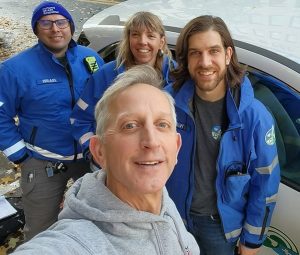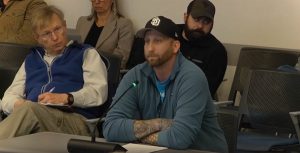Portland candidate campaigns for Cascadia preparedness
12 min read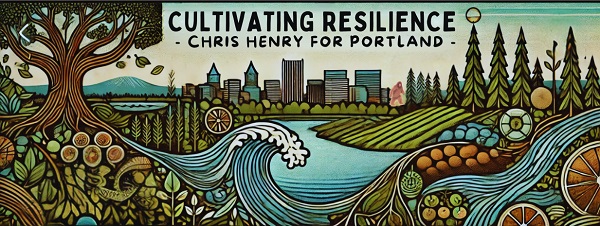
A candidate for Portland City Council says by preparing for the Cascadia earthquake, we can also address climate change, social justice, and food insecurity. Running in Northwest Portland’s District 4:
Chris Henry (Portland City Council candidate): Cascadia Ready is the number one top issue, and a lot of other candidates aren’t even addressing it. Some have picked it up, and kind of headed me off because they went first and they said, ‘Oh, there’s the Cascadia Subduction Zone earthquake. We really have to—.’ You know, they weren’t talking that language prior to this, and we came out of the gate talking about it and then connected it with what they were talking about, Zenith Energy and the CEI hub.
[00:00:44] Thomas Harun (Chris Henry campaign manager): We decided to make resilience—earthquake resilience especially—our focus, both as a way to kind of distinguish Chris’s candidacy in the campaign from the others, because it was something that I was really surprised by, going into this, is that there’s so little discussion of earthquake preparedness, even when we’re facing what will be the biggest earthquake in U.S. history, and none of the other city council candidates really want to talk about it.
[00:01:14] So when there’s a crowded field and ranked choice voting, it made sense to pick something. Also, just from a strategic perspective, that would distinguish the campaign and Chris from the other candidates. So something that stands out. And just like, oh, well, like in the voter guide, for instance, there’s over 100 candidates.
[00:01:33] If you search the voter guide for ‘Cascadia’ or ‘quake,’ the only city council candidate that shows up when you do that search is Chris. So I like the fact that we ran a pretty unique campaign in that regard, but the intention there is also hopefully to raise the profile of the issue. Because I think it should be a much bigger profile issue. It should be something that other candidates are talking more about.
[00:02:01] And then we’ve been learning about like soil liquefaction. One of the biggest risks we face here is that the 90% of the state of Oregon’s fossil fuels are in an earthquake liquefaction zone on the banks of the Willamette River, along with a lot of other toxic facilities.
[00:02:17] And, you know, the same typical story of a bunch of fossil fuel companies, city council, being lobbied, backroom deals, not getting rid of it, even when they should. I’m hopeful that we’re building the political pressure and that a lot of candidates are coming out against the CEI hub and hopefully at least some of those who are sincere in their opposition to it will get elected.
[00:02:38] So that’s a really big issue. They say it’ll be like worse than the BP oil spill if we don’t get that taken care of before the earthquake.
[00:02:46] Presenter: A six-mile stretch of the Willamette River in Northwest Portland is known as the Critical Energy Infrastructure (CEI) hub. Over 90% of all fuel used in Oregon moves through its 630 fuel tanks.
[00:03:00] Chris Henry (Portland City Council candidate): When the tanks rupture because of a subduction zone earthquake or just on their own—because they’re grandfathered in, they were built in like the ‘50s and they bought them like that—when the earthquake does happen and the worst case scenario is that, you know, our rivers, our fishing, our Earth is just completely destroyed by them, they can walk away. These guys don’t have to worry about that unless they have the risk bonding. But with risk bonding, they can’t walk away. You know, they’re the ones who have to foot the bill versus the taxpayer.
[00:03:36] But when the tanks go, when it goes into the river, there’s a chance that the electrical lines are going to snap. The electrical that’s hooked up in the area right close is going to create a spark. And then you’ve got Forest Park there. That fire’s just going race up the hill, and it’s a tinderbox. There’s not going to be a lot of time to warn them.
[00:03:59] And they do not know that PGE wants to, one, put in large transmission lines, and then, two, there’s a pipeline that needs to be, so say they, ‘upgraded,’ or it’s going to fail as well. So there are those two issues with PGE.
[00:04:17] Presenter: That leads to his second big issue, people’s utility districts.
[00:04:22] Chris Henry (Portland City Council candidate): They imposed an 18% increase, then they’re imposing a 7% interest increase through other means. And we’re talking about a 25% rate hike for ratepayers. So that’s got to be hitting working people in the pocketbook and people on fixed incomes, you know, and we’re talking about this is our second issue, is making PGE a PUD, a public utility district, people’s utility district.
[00:04:51] What we would like to do is we would like to have the neighborhood associations take over the PGE at the local level, because you have five people who normally show up to a neighborhood association. You’ve got a president or two co-chairs, a treasurer, a secretary, and one staff person. And now they will have a budget. They will be considered a government upon themselves.
[00:05:20] Thomas Harun (Chris Henry campaign manager): You know, we see it integrated. It’s like, we need it for economic justice. We need it for the renewables transition, but it also having a people’s utility district enables greater neighborhood autonomy.
[00:05:31] Decentralizing the grid is that’s another very important part of Cascadia Ready. The grid’s going to go down. So we’ve got to change the way we consume and produce and organize and distribute electricity and power and energy, to be able to weather the storm.
[00:05:49] Chris Henry (Portland City Council candidate): Yeah, localize, localize, localize, as much as possible. That’s the best way to do it is give it to the neighborhood associations and make them as powerful if not more powerful than the Portland City itself, because they will now have a budget and they can contact their neighbors, because they will be contacting their neighbors on rate things and stuff like that. Send out a newsletter, they’ll be able to have the budget to be able to contact people more frequently and on demand.
[00:06:21] Neighborhood associations should have a lot more power and ability to contact their people, and they don’t without a budget. This will get them a budget and not just that, but they can do checks, like, everybody gets solar panels or something like that.
[00:06:39] And they can do this. This is our next thing is, our third plank is and they kind of go hand-in-hand: A publicly-owned local municipal bank and bringing our money back from Wall Street. $110 million that we’re spending on Wall Street in just fees, fees and interest alone.
[00:06:57] So instead of lining the pockets of ultracapitalists, you know, hedge fund managers and whatnot, that’s a lot of money that we could bring back to Portland and working within the community and recycling that money in the community, working for the people.
[00:07:15] So, you know, that’s a way you can fund other projects, greening-up projects like, we’ve got green streets, which would depave streets.
[00:07:24] Because during the Eisenhower administration (my grandfather was Eisenhower’s speechwriter), we did the highway program, freeways and whatnot, and it all got linked up. And suburbia just started building up and when you get neighborhoods with a street right down the middle, those are dedicated to cars.
[00:07:44] They’re not dedicated to people walking, people walking their dog, their kids, the elderly, you know, it disconnects them. You’ve already got shut-ins, and then you’ve got these streets that separate you from your neighbor across the street. But we turn them into parks, and people start using bikes, we start delivering things on bikes using truck trikes, which are the three-wheeled trikes with the box on the back to deliver packages and freight.
[00:08:12] Presenter: He’s concerned about growing income inequality.
[00:08:16] Chris Henry (Portland City Council candidate): Workers, that’s a huge one for me. We should have a $25 an hour minimum wage connected to a cost-of-living adjustment that’s linked to not just inflation, but productivity, because that’s probably a bigger one. Because productivity has constantly increased and gone up. And we’re working harder, we’re producing more, and just connecting it to inflation keeps your numbers kind of flat.
[00:08:44] So there’s that. But when we talk minimum wage, we should be also discussing a maximum wage. We should be limiting how much a CEO can take out of a company because they take and take and take and take. And there has to be a point where we say, you know, there has to be some type of a guideline and a measure for them to hit a ceiling.
[00:09:07] And then they’re limited as well on what they can take from a company because that production, that productivity it’s brought up by workers, not by the CEO who, you know, the workers work harder and harder and harder and they increase productivity, wages don’t increase, but then they siphon all of that off and, you know, take all the cream off the top.
[00:09:30] So if we have a maximum wage with a wage ratio and connect the two, that way all boats will rise together.
[00:09:38] Presenter: Chris would like to see the neighborhoods offer permaculture education and projects.
[00:09:46] Thomas Harun (Chris Henry campaign manager): There is a pretty strong mandate for climate action here in Portland and so I think framing it in that context, framing it in the context of revitalization of downtown, there’s a lot of concern about like businesses leading downtown and kind of just, it’s getting dirty and kind of needs cleaning up.
[00:10:04] And so I think the most wholesome way to approach that discussion is to say, ‘Look, we can be employing people to be planting trees, planting flowers. We could be harvesting, we could be gathering fruit from the streets, bringing the communities together to do street paintings and things like that.’
[00:10:20] And I think permaculture, it’s usually not the policy solutions that are being proposed. Usually you’ll go alternative energy, like high-tech, lithium battery, that’s the go-to. But I think having a voice for saying, you know: What about our food system? What about touching grass and just reconnecting to the natural cycles and ensuring that our urban design is integrated with those principles?
[00:10:48] Part of our strategy is we’re trying to advance bioregionalism and also just strengthen the movement by trying to shift discussion of city government more bioregionally.
[00:10:58] So I’ve been volunteering with Regenerate Cascadia for the last year, year and a half. And as far as like permaculture goes, you know, we have connections permaculture folk here in Portland and also in Eugene. I mean, Lost Valley, we also took a trip to visit Mike Brunt, who’s with the Cascadia Seed Guild. He’s been doing this seed banking in Eugene as a permaculturist. He has like over a million seeds collected now of almost 2,000 varieties. just a really, really awesome guy in Eugene.
[00:11:30] And he introduced us to his friend, Monty, who does a lot of work with willows and was telling us that the big concern up here is shade equity, and I’m sure a lot of other parts of Cascadia in the country as well. And he was saying, ‘Look, you can get shade in a couple of months with willow.’ And so that’s a really fast way to resolve the issue. And he was showing us, he made a bench from willow and like these arches, there are all these ways you can do really cool bioarchitecture, you know, sustainable furniture, things like that with willow.
[00:12:01] So that’s the kind of thing we realized as we were researching is like how much of earthquake preparedness and permaculture, the two go hand in hand. We want to have sustainable design for retrofitting buildings, but it’s like we also want it to be climate-friendly. And so there are like very eco-friendly ways to do both.
[00:12:21] Nader Khalili is an Iranian American architect who came up with this design called Superadobe or earthbag houses. And that’s tried and true. It’s very affordable, uses only local materials, mostly dirt from around the area and they have withstood magnitude seven plus earthquakes in Nepal. They have been building earth bag villages and the only homes that survive the earthquake are the earthbag homes.
[00:12:48] But the soil liquefaction thing on a broader scale has caused us to as we’re thinking about this and campaigning on like, ‘Okay, what do we need to do to really get ready?’ It made us realize that: ‘Oh, all the techniques for improving soil quality, soil structure, soil stability, helping it stick together is actually what solves the problem of liquefaction. So getting anything that reduces erosion, like planting trees or fast growing crops like bamboo or hemp is going to help stabilize the soil growing mycelium because it produces glomalin, which is like the most prolific soil glue, helps stabilize the soil.
[00:13:26] And so anything like that, there are neighborhoods that are high-risk because the soil liquefaction and the government has maps of those things. Those are actually neighborhoods where permaculture gardeners coming in who have some idea of what are the things that are actually needed to stabilize the soil can help with earthquake preparedness.
[00:13:43] And then on top of that, just having emergency food and water supply is extremely important. The projections at the federal level are Washington/Oregon will have 2.5 million people who need emergency food and water aid for a full month. Which, if you look at how they’re handling the flooding on the east coast and how stretched thin FEMA has been, does not inspire confidence that they will be anywhere near able to meet that need.
[00:14:10] So we’re thinking like, it’s time for the Willamette Valley to get together, grow our own food. There’s so much fertile soil here and we have climate reasons to want to be more food sovereign and self-sufficient, ethical reasons to want to support restoring treaty rights, you know, regenerating the salmon, trying to take down the dams.
[00:14:29] It all kind of comes together. It turns out like a lot of the things we need to do to get ready for the earthquake are actually the things we need to do to get ready for climate change, or restore a right relationship with the land, or support social justice, or economic justice. And so that’s been a really exciting process and whatever happens with the election, our goal is to carry these things forward as a part of this bioregional movement.
[00:14:53] Presenter: With Portland’s ranked choice voting system, there’s less negative campaigning.
[00:14:59] Thomas Harun (Chris Henry campaign manager): We didn’t have to rely on negative campaigning because we’re not, we don’t really have to persuade anyone to not vote for other people, we just have to focus on getting Chris’s message out, getting Cascadia Ready to the front of people’s minds. And so I think that’s a part of why we’re like, we’re happy to focus on this.
[00:15:17] So when there’s 25 candidates and it’s ranked choice voting, our goal is just if people remember Chris’s name, it’s like, ‘Oh yeah, that guy, like the earthquake guy,’ then we’ve succeeded, right?. Very, very few people are like, ‘No, we shouldn’t get ready for the earthquake.’ We’ve gotten that once or twice in the last three months. It’s always very surprising.
[00:15:37] But otherwise it’s like, yeah, everyone agrees. It makes sense. It may not be the thing that people are the most worried about ’cause, you know, sometimes people are like, ‘Ah, that might not happen for a while,’ or, ‘I got more pressing issues.’ And that is, I think, understandable, but especially when there’s ranked choice voting, it’s like, okay, but it’s got to be in your top three, right? Preparing for the biggest earthquake in U.S. history.
[00:16:00] And so, you know, that’s the hope is that people, when they’re looking at the bigger picture and at least the people that we were able to reach with the campaign message, they’ll remember Chris’s name because it’s got just a very memorable issue associated with it, and they’ll be willing to say, ‘Hey, I may like some of these other candidates, but yeah, I really do think city council should get ready for the earthquake. We’ve got to have a champion who’s dedicated to elevating the issue.
[00:16:25] Presenter: Portland city council candidate Chris Henry. His campaign highlights Cascadia readiness by promoting decentralization and permaculture for greater resiliency.
This story was produced by John Q. for Whole Community News on KEPW 97.3 Eugene PeaceWorks community radio.

